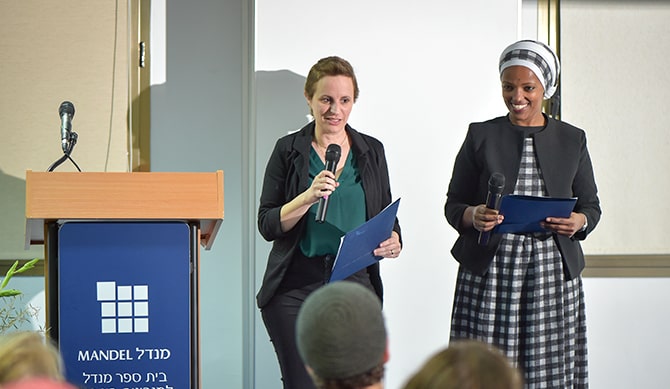Cohort 27 of the Mandel School for Educational Leadership presented the recommendations of the annual group exercise at an event held at the Mandel School for Educational Leadership on January 28, 2020. This year’s exercise was conducted in cooperation with the Ministry of Education’s Pedagogical Secretariat, as part of the Secretariat’s efforts to improve learning in middle schools (grades seven through nine), based on the "image of the ideal graduate of Israel’s education system in the 21st century" developed by the Ministry of Education.
As part of the group exercise, the fellows examined in depth two approaches to improving middle school teaching and learning. The first focused on achieving a balance between knowledge, skills, and values, and on the need to update these areas to meet the challenges of the 21st century. The second focused on teaching and learning that are organized around big ideas – ideas that are relevant to the lives of teachers and students, that give teachers and students meaning, and that help teachers and students answer the question, “Why are we learning?”
The recommendations of the fellows focus on three main areas: teaching units and their implementation, Arab society, and partnerships between schools and the Pedagogical Secretariat.

The recommendations regarding teaching units and their implementation relate to content development – especially in the digital realm, where special attention must be devoted to the connection between pedagogy and technology – and professional development of teachers in school settings. This focus promotes meaningful learning processes in terms of knowledge, professional approaches, and teaching practices.
In the area of Arab society, the fellows recommended professional development efforts in three circles of belonging: the individual-school arena, the community space, and the shared Israeli space. The fellows recommended that content should be specially adapted for each of these circles.
The fellows also recommended that partnerships between schools and the Pedagogical Secretariat be developed based on both geographic locations and on fields of study. This can be achieved by inviting schools to be partners, via requests for proposals, by implementing the change, and by designing and improving the change.
“One of the things I asked the fellows to do was to find our blind spots: what are we not looking at, what do we not see or understand” said
Dr. Miri Schlissel, chair of the Pedagogical Secretariat at the Ministry of Education, in her response to the presentation of the recommendations of the exercise. "And the fellows identified the areas that need support, as well as how this can be done," she continued. "This evening is a gift, a gift for us at the Pedagogical Secretariat and the Ministry of Education. This feeling of partnership… You may think that you’ve completed this project; in fact, we have much more work to do with you on all the details you have thought of and planned.”
“The group exercise is a major component of the second-year program of study here at the Mandel School for Educational Leadership. It is organized around a process of learning that involves understanding and wrestling with current issues of concern to the education system," said
Danny Bar Giora, director of the Mandel School for Educational Leadership. "This gives the fellows an opportunity to see how the system works in practice, not just in theory, and to get to know key figures in the field of education. No less importantly, it gives professionals in the field an opportunity to get to know the fellows,” he continued. “It has been a privilege to see your dedication to this exercise, your curiosity, your love of learning, and your teamwork. I’m convinced that this journey provided each and every one of you with a valuable learning experience.”
Read the recommendations of the fellows of Cohort 27 (Hebrew) >>
